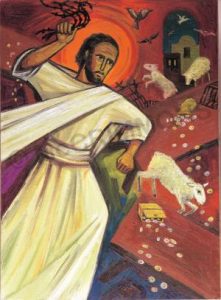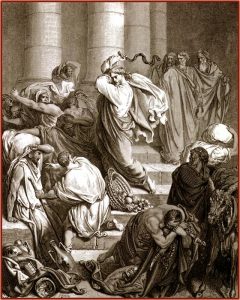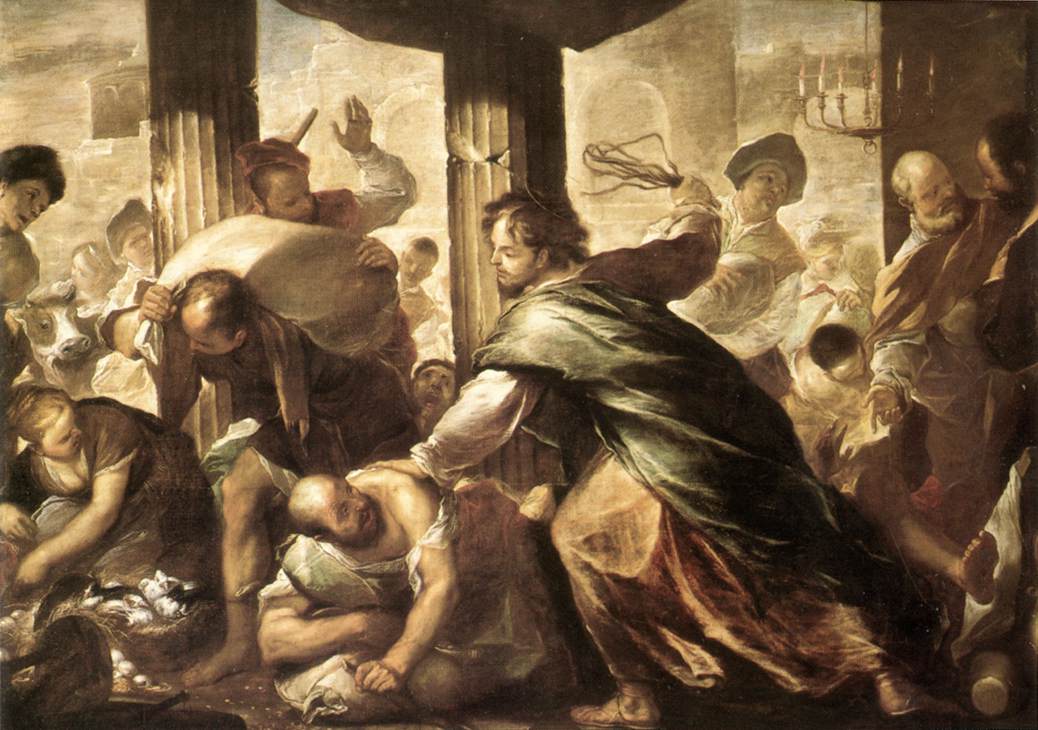Third Sunday in Lent Lectionary Reflection
March 8, 2015
In the temple [Jesus] found people selling cattle, sheep, and doves, and the money changers seated at their tables. Making a whip of cords, he drove all of them out of the temple, both the sheep and the cattle. He also poured out the coins of the money changers and overturned their tables. He told those who were selling the doves, ‘Take these things out of here! Stop making my Father’s house a marketplace!’” John 2:14-16
The scene of Jesus cleansing the temple has always been more than a little bit scary for me. I think the reason is that my “Sunday school nice” version of our Lord doesn’t allow for this kind of  radical behavior. This is over-the-top and scary Jesus sort of stuff. Angry Jesus, the one who turns over tables and scatters sheep or who curses fig trees, is not a Jesus I can control or keep in my sweet little Sunday only box. This is an unpredictable and fearsome Lord, one who will not be tampered with, placated, or pandered to.
radical behavior. This is over-the-top and scary Jesus sort of stuff. Angry Jesus, the one who turns over tables and scatters sheep or who curses fig trees, is not a Jesus I can control or keep in my sweet little Sunday only box. This is an unpredictable and fearsome Lord, one who will not be tampered with, placated, or pandered to.
This is the Lord author Annie Dillard images, saying “On the whole, I do not find Christians, outside of the catacombs, sufficiently sensible of conditions. Does anyone have the foggiest idea what sort of power we so blithely invoke? Or, as I suspect, does no one believe a word of it? The churches are children playing on the floor with their chemistry sets, mixing up a batch of TNT to kill a Sunday morning. It is madness to wear ladies’ straw hats and velvet hats to church; we should all be wearing crash helmets. Ushers should issue life preservers and signal flares; they should lash us to our pews. For the sleeping god may wake someday and take offense, or the waking god may draw us out to where we can never return.”
She’s right; we Christians are not aware or sufficiently sensible of conditions when it comes to God in any of the three persons of the Trinity. We prefer a small, safe, manageable deity; we hesitate to imagine the God whose sole purpose is to draw us into a relationship so complete that there is precious little room for anything of the other stuff of this world. The God of this week’s lectionary readings is expansive, expressive, and wholly unmanageable. To fully experience and approach the God of Moses and the prophets, of Jesus, and of Spirit breath, we must somehow get out of our heads and into our very gut (splanchna, σπλάγχνα in Greek), falling on our faces in the presence of such awe and mystery.
Lest we think this week’s gospel reading has nothing to do with us in 21st century western Christendom, it would be wise to consider what moneychangers exist in our modern congregational edifices. What currency must be exchanged in order to “rightly” worship and enter the community today? We may not have doves, sheep, and cattle in the sanctuary, but what about the lattes and the fabulous worship productions or the battles between organ and praise band? What about the cult of immediacy and trappings of trendiness? Whether we’re out to “kill Sunday school” or reinvent the beloved community, we are still at risk of falling into the trap of a currency exchange of faith.
 So what’s a Body of Christ to do? Well, focus on the body–of Christ. It’s all about Jesus, folks. It’s about that untamed, mysterious, radical son of man who demands us to be completely consumed by him and to consume him completely in word and sacrament. It’s about falling wholly in love with the wild wholly Other. It’s to be swept off our feet by the risen Christ and fully focused on following him.
So what’s a Body of Christ to do? Well, focus on the body–of Christ. It’s all about Jesus, folks. It’s about that untamed, mysterious, radical son of man who demands us to be completely consumed by him and to consume him completely in word and sacrament. It’s about falling wholly in love with the wild wholly Other. It’s to be swept off our feet by the risen Christ and fully focused on following him.
Branding, innovating, reframing, and reimagining church is not necessarily a bad thing; in fact, it is necessary to measure how we’re doing in communicating the good news and equipping God’s people, but being church is not so much about marketing and metrics as it is about faithful discipleship. You can bet your last goat or turtledove that when we do get sidetracked, the all-consuming Jesus will start turning over a few tables and discomforting the comfortable.
Be ready. Be prepared. Put on those crash helmets and expect a miracle. To do less is to try to stuff Jesus back into the box, and trust me; he’s not having any of that. Blessings on your preaching and teaching. Cast a worthy vision of our all-consuming and gracious God.
In Worship
The money changers stood between the people and worship of God. Because coins of the realm (bearing the image of Caesar) could not be used in the temple to purchase animals for sacrifice, money changers would provide a currency exchange service, taking of course a hefty surcharge for their efforts. Do we have “money changers” in our congregations or judicatory bodies today? While there probably aren’t people changing currency, what sort of blocks and hindrances to we consciously or unconsciously put into place that prevent people from experiencing and worshiping God? What sorts of things are we doing or not doing that Jesus might want to shake up and sweep out? Consider setting up a table in the sanctuary with some fake coins on it. Decorate it how you think is best. Invite worshipers to write on small cards things that prevent effective worship and ministry in our world. Offer a prayer of repentance and literally turn the table over to let the fake coins and the paper slips go flying. Invite worshipers to pray for wisdom and courage to keep the tables turned so that no barriers exist to prevent people from coming to God in your worshiping community.
With Youth
Psalm 19 is a wonderfully sensory song of praise. Invite youth to work on a creative project using this psalm. They might make a video, write a song, create a collage, or come up with a dramatic reading. Encourage them to use all of their senses to create a piece of worshipful art that communicates this psalm in a fresh way.
With Children
If you have access to two tablets (iPads or other tablets will work just fine), open a notes page or document and print simple versions of commandments one through five on one tablet and six through ten on the other. Invite the children to come forward and remind them that Moses went to the mountaintop so that God could give him two tablets with commandments to help the people of Israel live well. Ask them what sort of tablets God might write on today. Pull the iPads out so that the children can see the commandments written on the screens (Many children will be as or more proficient with tablets than adults!). These are definitely tablets we don’t want to throw down and break in case of misbehavior! However, the commandments written on those old stone tablets are just as useful to use today in the digital world. Talk briefly about how the commandments are useful in telling us how to be in relationship with God and relationship with one another. They help us live within safe guidelines so that everyone can be productive and can flourish. Finish with a prayer. Give each child a copy of the commandments and invite them to learn and study them at home every night.
(Photos: Lucas Giordano and Malcolm Goldstein, Wikimedia Commons. Thanks!)




Leave a Reply